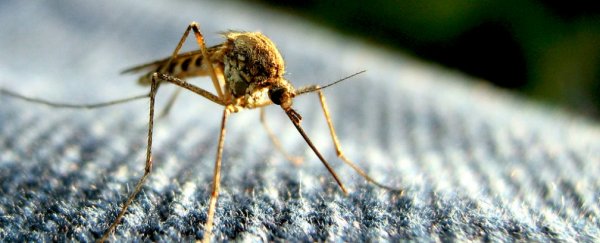Australian researchers have found a new way to create a safe, natural mosquito repellant from native essential oils, using the processing power of the Sun. Early trials show that it's at least as effective as the controversial insecticide DEET, which is currently the most widely used chemical insect repellant.
The product offers a much-needed alternative to reliably protect against mosquitoes, and the diseases they spread, and could have a huge impact in rural and developing regions. "Our ultimate goal is to manufacture a fragrant insect-repellent with pharmaceutical activity using only environmentally friendly ('green') conditions," lead researcher Michael Oelgemoller told ScienceAlert over email.
The unique part about the repellant is the methodology that's used to make it, which relies entirely on sunlight. Created by scientists at James Cook University in northern Queensland, the process uses solar technology to transform local essential oils into commodity materials, which can then be used in insect repellants or other pharmaceutical and fragrance products.
The best part is that the method is incredibly simple and cheap, and can be performed almost anywhere. "The chemical transformation solely uses water, a household acid (available at any supermarket) and solar heat," says Oelgemoller. "Isolation is possible by steam distillation, a technology used excessively in the essential oil industry."
The new repellant is processed from the oil of an Australian tree, and trials so far have shown that it's as effective at warding off mosquitoes and sandflies as DEET.
"DEET has become highly controversial, is an irritant, has unpleasant odours, and has been linked to health concerns including brain damage in children," Oelgemoller explains. "DEET is also produced from non-sustainable sources such as petrochemicals using harmful chemicals."
While natural repellants such as tea tree oil are a popular alternative, they're not as effective and require constant reapplication. Oelgemoller hopes that their alternative offers the best of both worlds, by throwing mosquitoes off the scent naturally. "It is believed that the repellent masks the 'attracting' odours that humans emit so that mosquitos are unable to locate their target," Oelgemoller explains.
The team is now looking for investors to help commercialise their product. The ultimate goal is to find a way to cheaply upscale the manufacturing of the repellant so that it can help protect the millions of people in the world who are vulnerable to mosquito-borne diseases.
"Our technology will allow easy integration of a novel and high-value product - a powerful insect repellent - using existing equipment within the essential oil industry," says Oelgemoller. "It can also be used in undeveloped countries in the tropical region, for example Papua New Guinea, where insect-borne diseases are endemic."
Love science? Find out more about studying at James Cook University.
